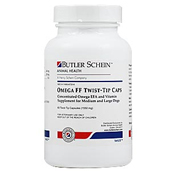Skin allergies in dogs are very common, with about 15% of dogs affected to some degree. Dogs tend to react to allergens with skin symptoms, and even inhaled allergens such as pollen or dust can trigger skin itching and other symptoms in dogs. Prompt treatment of allergic skin conditions can prevent complications and improve your dog's quality of life by minimizing itching and other symptoms.
"Minor allergies may respond to home care with natural treatments, and some dogs may benefit from trying non-medicated treatments before moving on to drugs with side effects and interactions."
Symptoms of skin allergies in dogs may include itching, chewing, poor coat length or texture, hot spots, rashes, flaking, and self-mutilation. Your dog may also constantly lick his feet or legs, rub his face on your carpet, or press his body against wall corners when walking around the house. These behaviors are attempts to scratch itchy, allergic skin.
Treating Skin Allergies in Dogs

Treatment of skin allergies in dogs involves alleviating symptoms, suppressing the immune reaction responsible for the allergic symptoms, and eliminating the underlying trigger when possible. Allergies to fleas require elimination of existing fleas and preventive treatment to keep fleas from biting your dog.
Over-the-counter ointments to soothe itchy skin are available and improve symptoms of minor allergic reactions. Your veterinarian may also recommend over-the-counter sprays containing low-dose cortisone for short-term use.
More severe allergies usually require treatment with corticosteroids to reduce inflammation and itching. These medications are effective, but they may produce potentially serious side effects when used at high doses or for long periods. Oral antihistamines are often used in conjunction with corticosteroids in the treatment of more severe allergies, and these drugs are generally safe and well-tolerated when used as directed. Unfortunately, they may cause some drowsiness, making them less than ideal for many dogs. Atopica, an immunosupressant medication, is FDA-approved for treating skin allergies in dogs over 6 months of age.
Allergy shots, or immunotherapy, are a permanent solution to allergies in dogs, but this treatment option is expensive and may take a year or more of repeated shots to work. Plus, not all allergies respond to immunotherapy.
Natural Treatments for Skin Allergies

Minor allergies may respond to home care with natural treatments, and some dogs may benefit from trying non-medicated treatments before moving on to drugs with side effects and interactions. This is especially true for older dogs and for those already taking multiple medications for other conditions.
Minor itching may respond to oatmeal baths in cool water given several times per day. Shampoos and sprays containing witch hazel may also be beneficial when treating localized skin symptoms at home.
Daily supplementation with omega-3 and omega-6 fatty acids improves symptoms in 20% of dogs with allergies, according to Lowell Ackerman, D.V.M. The fatty acids provide a natural anti-inflammatory benefit and cause no side effects when used at appropriate doses.
Avoidance of known or suspected allergens is key to minimizing symptoms and preventing allergic reactions. Use a HEPA filter inside your home to reduce exposure to pollens and dust, keep your car and home windows closed as much as possible, monitor your pet's diet for food allergies, and place activated charcoal on top of exposed soil in your houseplants.
References
http://pets.webmd.com/dogs/dog-skin-allergies-reactionsAckerman, L. (1994) Guide to Skin and Haircoat Problems in Dogs. Loveland, CO: Alpine Publishing.
The above is provided for information purposes only and should not be used for the diagnosis or treatment of any condition.
This information does not cover all possible variables, conditions, reactions, or risks relating to any topic, medication, or product and should not
be considered complete. Certain products or medications may have risks and you should always consult your local veterinarian concerning the treatment of
your pet. Any trademarks are the property of their respective owners.